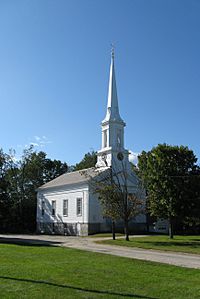Royalston Common Historic District facts for kids
Quick facts for kids |
|
|
Royalston Common Historic District
|
|

First Congregational Church
|
|
| Location | Royalston, Massachusetts |
|---|---|
| Area | 30 acres (12 ha) |
| Built | 1752 |
| Architect | Chase, Chauncey |
| Architectural style | Greek Revival, Second Empire, Federal |
| NRHP reference No. | 76000304 |
| Added to NRHP | December 12, 1976 |
The Royalston Common Historic District is a special area in Royalston, Massachusetts, that looks much like it did a long time ago. It's like stepping back in time! This historic district is centered around a big open space called a "town common," which was first planned way back in 1752. It's one of the best examples of an old 18th-century town center left in Massachusetts.
This important district was added to the National Register of Historic Places in 1976. The common itself was even named one of the 1,000 best places to visit in Massachusetts by a special state commission.
Contents
How Royalston Began
The land that is now Royalston was bought by a group of business people from Boston in 1752. Right away, they planned out the town common and a cemetery. Building homes and shops happened slowly at first during the 1700s.
Around 1800, there was a lot of building! Many new houses, shops, and a "meeting house" (a building used for church and town meetings) were built.
Royalston's Early Growth
For a short time, Royalston was an important place for trade. Farmers from nearby areas would come here to sell their goods. This made it a busy market town.
However, by 1850, this busy time had ended. Royalston became mostly a place where people lived. Some beautiful houses were built by people who owned mills in South Royalston, adding interesting styles to the town.
Exploring the Common Today
The historic district is mainly found along Main Street, which is also Massachusetts Route 68. This street runs north and south. The district is located between two places where three different roads meet, leading to other towns.
The town common, which is the heart of this area, was first planned in 1752. It got its current shape around 1840.
Buildings Around the Common
Around the common and along the nearby roads, you'll find many homes. Most of these houses were built before 1850. The town's main government buildings are also here.
What's really cool is that these buildings haven't changed much since the 1850s. Some newer buildings were added later, but they fit right in. For example, the town hall was built in 1867 in a style called Second Empire. The library, built in 1911, is in the Colonial Revival style.



